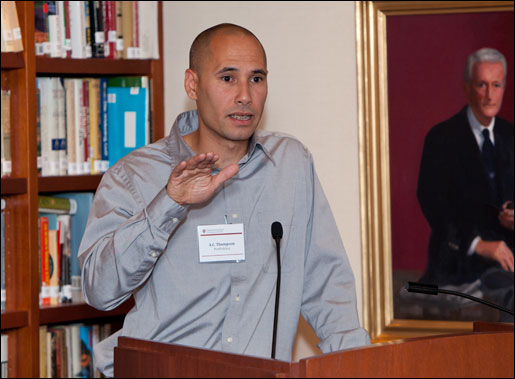2012 Georges Conference on College Journalism
The Nieman Foundation invited 80 student journalists from 19 college newspapers to the annual
Georges Conference on College Journalism at the end of March. The event featured talks, panel discussions and workshops led by past and present Nieman Fellows and other leading journalists who shared their insights and expertise.
ProPublica staff writer A.C. Thompson kicked off the two-day event with his opening keynote address “Traditional Journalism in Alternative Newsrooms: The New Normal.” Thompson spoke about his own reasons for pursuing a career in journalism and shared tips for young journalists, including the importance of finding a mentor and getting out in the streets to report, far away from desks and computers.
“Reporting truly has the power to change lives, to make the world more equitable,” Thompson said. He added that he considers his work to be a form of archaeology: “I seek to excavate facts that others have buried. Fundamentally, the stories I do are about justice about those with power harming the less powerful and getting away with it.” In the fall of 2011, Thompson received the
I.F. Stone Medal for Journalistic Independence from the Nieman Foundation.

On the second day of the conference, the students heard from David Cook, senior editor and Washington bureau chief for The Christian Science Monitor and host of the Monitor’s newsmaker breakfasts. In his talk, “The View from Washington,” he spoke candidly about his own experience as a journalist, the long history and evolution of the Monitor, the seismic shifts in the newspapers industry and the changing relationship between the press and politics.
Other conference sessions included Investigative Reporting 101: Uncovering information and digging deep on campus and beyond; Think Digitally: How to report beyond print, beef up your newspaper’s website and navigate social media journalism; An Intro to Multimedia: Reporting with sound; and Lessons from the Pros, a Q&A session on a wide range of topics important to student journalists.
The conference was co-sponsored by the students from
The Harvard Crimson, under the direction of Crimson President Ben Samuels, who assisted visiting students on campus and hosted a dinner for participants at the end of the conference.
The Nieman Foundation is deeply grateful to the family of journalist
Christopher J. Georges for supporting this annual conference, which provides young journalists with new ideas, skills and resources. The foundation is also thankful for the speakers and Crimson volunteers who help make the gathering possible.
- Learn more about the 2012 conference and participants
- View our list of resources for student journalists
- See a list of the participating college newspapers
- Watch slideshows from the 2012 Georges Conference
The Christopher J. Georges Award for Excellence in Student Journalism
The 2012 Christopher J. Georges Award for Excellence in Student Journalism was presented at the end of the conference to Henry Rome and Gabriel Debenedetti of The Daily Princetonian for “
The Arming Question,” an in-depth three-part series that examined the debate over arming public safety officers at Princeton University. Rome, a senior writer and director of investigations, and Debenedetti, the series editor and Princetonian’s previous editor-in-chief, worked together on the winning series, the first project produced by the paper’s new investigative team.
The award was presented by award judge David Joyner, vice president for content at Community Newspaper Holdings, Inc. in Birmingham, Ala., and the 2012
Donald W. Reynolds Nieman Fellow in Community Journalism.
Students from The Heights at Boston College were also recognized as runners-up in the contest for their coverage of the contentious legal battles surrounding the Belfast Project, an oral history project on Northern Ireland based at Boston College. Students honored included reporters David Cote and Daniel Tonkovich and Taylor Kumpf, editor-in-chief.
The Christopher J. Georges Award for Excellence in Student Journalism honors exceptional, in-depth reporting by a student reporter on a policy issue of importance affecting his/her campus, community, or beyond. Judges look for reports that delve beneath the surface of the story and presenting all sides of its complexities with fairness and accuracy.
The Georges Award aims to encourage and promote the type of journalism Christopher Georges loved best: feature stories that do not simply examine policy making and reform, but explore from a human perspective both the intended and unintended consequences of these policies on the people who are affected by them.
Friday Reception
Saturday Seminars